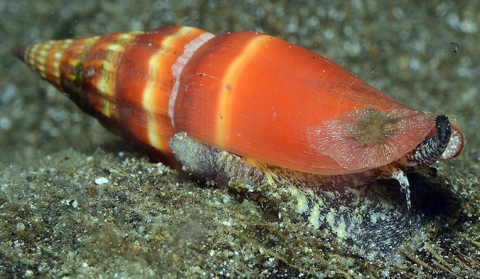
The venoms of predatory marine molluscs of the genus Conus are being studied intensively due to the biomedical applications of conotoxins, the neuropeptides they contain. However, some other groups of gastropods have independently acquired a venom gland morphologically identical to that of the Conus and presumably also use the venom for hunting and defense against predators.
A group of researchers from IEE RAS and the Institute of Bioorganic Chemistry performed the first comprehensive study of the venoms of the most interesting of these taxa, the genus Vexillum. A scientific article based on the results of the study was published in the journal Proceedings of the Royal Society B: Biological Sciences. Ph.D. Alexander Fedosov, Ph.D. Sofia Zvonareva, Ph.D. Elena Mekhova and Ph.D. Polina Dgebuadze.
Based on a detailed study of transcriptomes (a methodology for determining the composition of expressed genes) and proteomes (analysis of tissue protein composition) of the salivary and venom glands of four Vexillum species, the researchers showed that Vexillum mollusks do indeed secrete complex poisons. They are dominated by short protein toxins, the spatial structure of which is maintained by disulfide bridges between cysteine residues. In this respect, and due to the high number of post-translational modifications of amino acid residues, vexitoxins are strikingly similar to conotoxins. Many vexitoxins adopt spatial conformations (i.e., the relative positions of key amino acid residues) that are characteristic of the most physiologically relevant animal toxins. Therefore, vexitoxins have significant potential as a new source of bioactive peptides for medicine development and neuroscience.
The work was supported by the Russian Science Foundation.
Related materials:
Газета.ру: "Российские ученые придумали, как использовать яды моллюсков для обезболивания"
